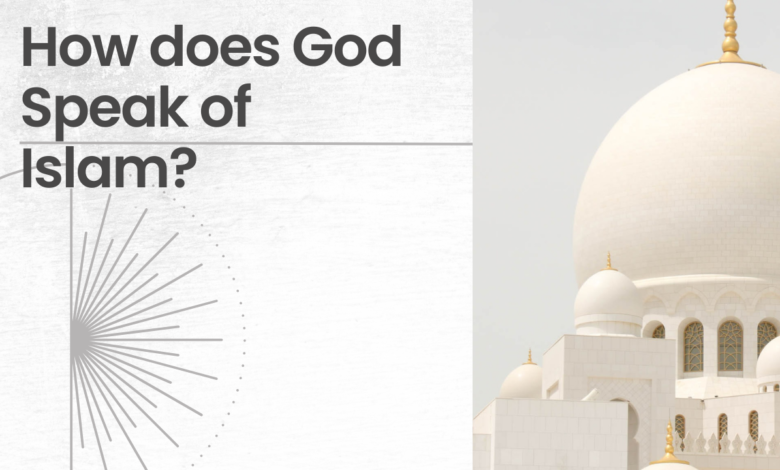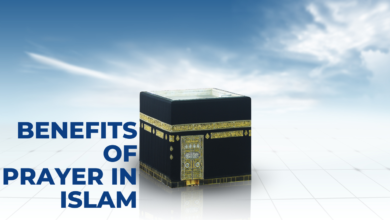How does God Speak of Islam?
Exploring God's Message in Islam: A Path to Monotheism and Compassionate Submission

How does God Speak of Islam?
The primary source through which God speaks of Islam is the Quran, which is considered the literal word of God in Islamic belief.

Introduction
Islam is one of the world’s major religions, with over a billion followers worldwide. It is a faith rooted in the belief in one God, Allah, and the teachings of the Prophet Muhammad. To understand how God speaks of Islam, we must delve into the holy scriptures of Islam, primarily the Quran, and explore the core principles and messages contained within.
The Quran: The Word of God
In Islam, the Quran is believed to be the literal word of God as revealed to the Prophet Muhammad through the angel Gabriel over a period of 23 years. Muslims regard the Quran as the ultimate source of guidance, wisdom, and divine knowledge. It is in the Quran that God speaks to humanity about Islam, its beliefs, practices, and the way of life that is expected of its followers.
Also check.
- Where did Islam Originate?
- When was Islam Founded?
- What is the Holy Book of Islam?
- Who is the Wessiah in Islam?
- What is Shirk Islam?
Monotheism: Tawhid
The foundation of Islamic belief is the concept of Tawhid, which is the absolute oneness of God. God speaks of this central idea in numerous verses throughout the Quran. One of the most well-known verses that emphasize Tawhid is found in Surah Al-Ikhlas (Chapter 112): “Say, He is Allah, [Who is] One, Allah, the Eternal Refuge. He neither begets nor is born, nor is there to Him any equivalent.” This verse highlights the pure monotheistic nature of God in Islam.
Submission to God’s Will
The word “Islam” itself means submission or surrender to the will of God. God’s message in the Quran emphasizes the importance of submitting to Him entirely, seeking His guidance, and living a life that aligns with His commandments. Surah Al-Baqara (Chapter 2), verse 208 states: “O you who have believed, enter into Islam completely [and perfectly] and do not follow the footsteps of Satan. Indeed, he is to you a clear enemy.”
Compassion and Justice
God’s message in Islam also highlights the importance of compassion, mercy, and justice. Muslims are called to live their lives in a way that reflects these values. The Quran, in Surah Al-Nisa (Chapter 4), verse 135, reminds believers: “O you who have believed, be persistently standing firm in justice, witnesses for Allah, even if it be against yourselves or parents and relatives. Whether one is rich or poor, Allah is more worthy of both.“
Moral and Ethical Guidelines
The Quran provides a comprehensive set of moral and ethical guidelines that encompass all aspects of life, from personal conduct to societal interactions. These guidelines serve as a code of conduct for Muslims, guiding them in their daily lives. God speaks of these principles throughout the Quran, emphasizing the importance of honesty, kindness, charity, and the pursuit of knowledge.
Brotherhood and Unity
Another central theme in the Quran is the concept of brotherhood and unity among believers. God speaks of the importance of maintaining strong ties with fellow Muslims and treating one another with respect and kindness. In Surah Al-Hujurat (Chapter 49), verse 13, God reminds believers: “O mankind, indeed We have created you from male and female and made you peoples and tribes that you may know one another. Indeed, the most noble of you in the sight of Allah is the most righteous of you.”
Conclusion
God’s message in Islam, as conveyed in the Quran, is a call to monotheism, submission to His will, compassion, justice, morality, and unity among believers. These core principles shape the beliefs and practices of Muslims around the world and guide them in leading a life that is pleasing to God. Understanding how God speaks of Islam is not only important for Muslims but also for anyone interested in interfaith dialogue and gaining a deeper understanding of this major world religion.

FAQS
What is the primary source through which God speaks of Islam?
The primary source through which God speaks of Islam is the Quran, which is considered the literal word of God in Islamic belief.
What is the central concept emphasized by God in Islam?
The central concept emphasized by God in Islam is the belief in the oneness of God, known as Tawhid.
How does God call believers to live according to His will in Islam?
God calls believers to submit entirely to His will, seeking His guidance and living in accordance with His commandments.
What are the core values and principles God speaks of in Islam?
God speaks of values such as compassion, justice, morality, and unity among believers in Islam.
Are there specific moral and ethical guidelines provided by God in Islam?
Yes, the Quran provides comprehensive moral and ethical guidelines that cover personal conduct, societal interactions, and various aspects of life.
How does God emphasize the importance of brotherhood and unity in Islam?
God underscores the significance of maintaining strong ties with fellow Muslims and treating one another with respect and kindness as part of the Islamic message.
Is there a specific verse in the Quran about the oneness of God?
Yes, Surah Al-Ikhlas (Chapter 112) contains a well-known verse that highlights the oneness of God.
What is the ultimate goal of understanding how God speaks of Islam?
The ultimate goal is to guide Muslims in leading a life that is pleasing to God and to foster a deeper understanding of Islam for individuals interested in interfaith dialogue.
How can people from different religious backgrounds learn about God’s message in Islam?
People from various religious backgrounds can learn about Islam through the Quran, by reading scholarly interpretations, and engaging in interfaith discussions and dialogue.
Is the Quran the only source through which God’s message in Islam is conveyed?
While the Quran is the primary source, Hadith (the sayings and actions of the Prophet Muhammad) and Islamic jurisprudence also play a significant role in understanding and interpreting God’s message in Islam.




